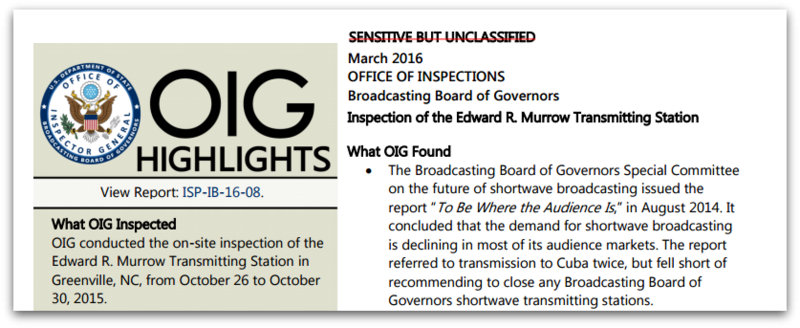
Many thanks to SWLing Post contributor, Richard Langley, who shares a link to the Broadcasting Board of Governor’s Fiscal Year 2016 Congressional Budget Request.
Click here to download as a PDF.
I’ve read key portions of the request.
Regarding shortwave, the BBG are asking for budget reductions in almost all of the BBG shortwave broadcasting arms, with a few exceptions. They acknowledge, in each case, that shortwave broadcasting is not as cost-effective as other means of distribution (including FM, Internet and satellite). The do acknowledge that shortwave broadcasting is still needed in some strategic markets. Here is, perhaps, the most telling quote I found:
“To serve audiences in less developed areas of the world, BBG must continue to broadcast via traditional technologies such as shortwave and maintain capability on these platforms by replacing antiquated equipment. But to stay relevant in competitive news markets and serve current and future audiences, BBG must invest in new cutting-edge technology. In areas where ownership and usage of shortwave radio has declined significantly, the Agency has evolved away from broadcasting in shortwave.”
A few specific highlights from the request:
Page 19
4) ENHANCE HIGH FREQUENCY TRANSMISSION CAPABILITY ($2.8M)
BBG will continue the shortwave realignment project that began in FY 2014, which increases shortwave transmission capability at its Kuwait Transmitting Station. This enhancement provides improved coverage to underserved areas of the world and
reduces operating costs by decreasing reliance on external leases. All aspects of
this proposal focus on improving transmission capability, while continuing
to reach audiences in Africa, Afghanistan, Pakistan, Iran, Tibet and
Western China. The added capacity will support broadcasts for RFE/RL, RFA and
VOA.
At $2.00 per broadcast hour, Kuwait provides the highest return on investment in the BBG transmitting station portfolio. Thus, BBG began expansion of the facility in FY 2014 with
the construction of a new high frequency antenna and design of the transmitter building expansion. The proposed investment, extending through FY 2018, will bring the Kuwait
Transmitting Station up to the maximum capability allowed by the country agreement and will enable the Agency to decrease overall operating costs for the foreseeable future. When the realignment project is completed, the Kuwait station will have ten shortwave transmitters with associated antennas.[…]
Page 22:
Reduce Shortwave Costs [-$2.90M] The Office of Technology, Services, and Innovation (TSI) will eliminate less effective transmission frequencies and realign transmissions to end high cost leases. TSI will realize additional reductions to antiquated technologies by reducing transmissions to Afghanistan, Pakistan, Burma, and Kurdish-speaking regions and eliminating shortwave to Russia, the Caucasus, Belarus, Laos, Cambodia, Rwanda, and Burundi. Audiences in these countries access news and information on more efficient,[…]
Page 69
STRATEGY BASED ON AUDIENCE
MEDIA HABITS
Using research on audience media habits, TSI will continue to move away from less effective legacy shortwave and medium wave transmissions toward other technologies, where appropriate, to reach larger and younger audiences. Where shortwave remains important, TSI is building a more cost-effective transmission infrastructure to support broadcast requirements. Of particular note are efforts at the Kuwait Transmitting Station. Because of the station’s strategic importance and low operating costs, TSI is installing a new shortwave antenna that is expected to be operational in FY 2015 and will expand the station’s transmitter building in FY 2016 to accommodate future transmitter build-outs.[…]
Page 109
To serve audiences in less developed areas of the world, BBG must continue to broadcast via traditional technologies such as shortwave and maintain capability on these platforms by replacing antiquated equipment. But to stay relevant in competitive news markets and serve current and future audiences, BBG must invest in new cutting-edge technology. In areas where ownership and usage of shortwave radio has declined significantly, the Agency has evolved away from broadcasting in shortwave.
BBG has closed transmission stations, repurposed equipment and invested these savings in platforms that the audience has shifted to, primarily in digital media technology and other high-priority programming.
Click here to download the full request as a PDF.






 Some of you may have noticed that the Voice of America has been having problems with their online and internal digital content the past few days.
Some of you may have noticed that the Voice of America has been having problems with their online and internal digital content the past few days.